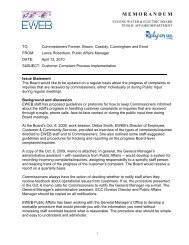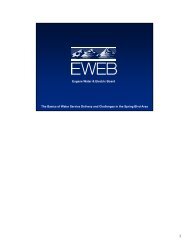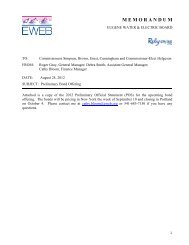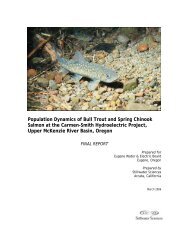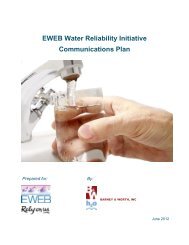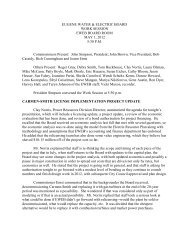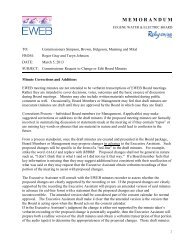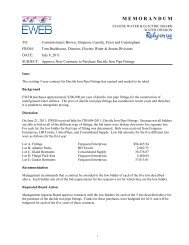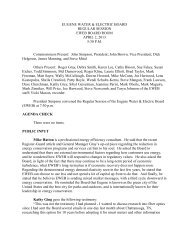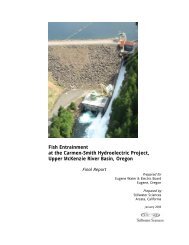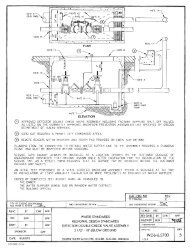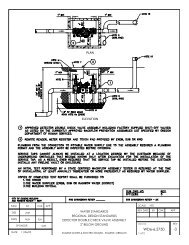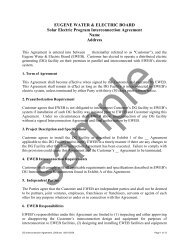Work Session Minutes - Eugene Water & Electric Board
Work Session Minutes - Eugene Water & Electric Board
Work Session Minutes - Eugene Water & Electric Board
- No tags were found...
Create successful ePaper yourself
Turn your PDF publications into a flip-book with our unique Google optimized e-Paper software.
EUGENE WATER & ELECTRIC BOARDWORK SESSIONEWEB BOARD ROOMAPRIL 3, 20125:00 P.M.Commissioners Present: John Simpson, President; John Brown, Vice President; BobCassidy, Rich Cunningham and Joann ErnstOthers Present: General Manager Roger Gray, Debra Smith, Mel Damewood, BradTaylor, Wally McCullough, Clay Norris, Jill Hoyenga, Tom Buckhouse, Susan Eicher, CathyBloom, Mark Freeman, Claire Elliker-Vaagsberg, Sue Fahey, Michelle Martin, TammyDenOuden, Sheila Crawford, Bob DenOuden, Kevin Biersdorff, Dean Ahlsten, Jill Hoyenga,Clay Norris, Lance Robertson, Richard Jeffries, Mike Logan, Felicity Fahy, Paula Kennedy, LeeProciw, Jeannine Parisi, Joe Harwood, Charlie Walker, Bill Welch, Patty Boyle, Wendi Schultz-Kerns, Mike McCann, and Taryn Johnson of the EWEB staff; Vicki Maxon, recorder.President Simpson convened the <strong>Work</strong> <strong>Session</strong> at 5:00 p.m.YEAR-END AUDITED FINANCIAL STATEMENTS ANDMANAGEMENT LETTERCathy Bloom, Financial Services Manager, introduced Julie Desimone from Moss-Adams.Using overheads, Ms. Desimone gave reviewed the agenda for her presentation andbriefly summarized the management letter which the <strong>Board</strong> has already reviewed.She then commented that EWEB had received a clean opinion on their financialstatements and no exceptions from or non-compliance with Oregon Minimum Standards wasfound and, as a result, there are no unanticipated audit adjustments.She noted that there were two open jobs remaining on the books in <strong>Water</strong> Operationswhich should have been closed at year-end, and that better administration of federal grantmanagement was really the only recommendation that was made.President Simpson asked if EWEB has existing staff who can perform thatadministration. Susan Eicher, General Accounting & Treasury Supervisor, replied that there isstaff already in place to do that, and that this is a matter of further educating that person on theprocess.Vice President Brown asked how unfunded liability will affect EWEB’s bond rating. Ms.Bloom replied that even though EWEB is seen as proactive in this area, the current unfundedliability amount is not very favorable and could be viewed negatively if it is not dealt with.Ms. Desimone then answered some clarifying questions from the <strong>Board</strong> regarding OtherPost-Employment Benefits (OPEB) and Public Employee Retirement System (PERS)contributions. Regarding PERS, Ms. Desimone noted that new standards are being developed
<strong>Work</strong> <strong>Session</strong>April 3, 2012Page 2 of 4and that she is expecting some final information on that in June 2012, and she will pass thatalong to staff.Commissioner Cunningham stated that this is one of the best audits he has seen and thathe is very proud of EWEB’s audit staff.Commissioner Cassidy asked about the progress of the information technology upgrade.General Gray replied that capital plans include funding to pursue a second data center in2013, and that procedures have been improved but the physical side is not where it should be yet.Ms. Desimone told the <strong>Board</strong> that if they had further questions, they could pass them onto staff and they will be forwarded to her.On behalf of the entire <strong>Board</strong>, President Simpson thanked Ms. Desimone for her workand said he is pleased that the <strong>Board</strong> assisted with making the audit process easier this year.WATER RATES DESIGN PROCESSSue Fahey, Fiscal Services Supervisor, introduced consultants Joe Healy and Tom Gouldof HDR, who have begun the process of reviewing high-level methodologies to establish costbasedwater rates.Using overheads, Mr. Healy gave an overview of the various methodologies used toestablish cost-based water rates, the key issues for EWEB’s water rate study, and the process inwhich to gain feedback from the <strong>Board</strong> about further key issues that may need to be addressed.Key Issues:1. Reduced consumption2. Elevation surcharges3. Funding utility revenue requirements4. Identifying and understanding key drivers and internal drivers for any rate proposaland revised rates5. Establishing cost-based wholesale water rates (water districts)Finally, Mr. Healy reviewed the next steps in the study and answered clarifying questionsfrom the <strong>Board</strong>.Ms. Fahey stated that staff will come back to the <strong>Board</strong> on June 5, 2012 with some ratealternatives and for a richer discussion regarding rate elasticity and other factors. She added thatif the <strong>Board</strong> wishes, staff can conduct two-on-one informational meetings in May, previous tothe June meeting.Commissioner Cassidy asked what services EWEB provides for water districts. MelDamewood, <strong>Water</strong> Engineering Manager, replied that EWEB provides meter reading and billingservices, but that repairs are direct billed under a service contract. He added that when the
<strong>Work</strong> <strong>Session</strong>April 3, 2012Page 4 of 4Mr. Norris then reviewed the possible impacts of renewable generation integration,including electric vehicle dynamic charging and most of the above demand response programs.In summary, he stated that staff believes that partnering with EWEB’s customers is keyto power supply and the energy future of EWEB.A lengthy discussion ensued regarding peak reduction opportunities, behavior-basedconservation, the timing of appliance use, avoiding certain hours of energy usage, and how all ofthose factors affect rates and billing. The possibility of setting conservation goals and offeringbilling credits to customers was also discussed.Commissioner Ernst stated that she would like further <strong>Board</strong>/staff discussion on howcustomers can be more proactive in conserving energy and in lowering their bill without the aidof smart metering or in-home displays.Vice President Brown commented that no new program will be successful unless EWEBengages the community. For example, the steam conversion process could have been done 10years ago if those businesses using steam heat had known how much more efficient and lowercost it would be to convert to electric or natural gas. He added that a separate outreach processwould be necessary for customers such as the University of Oregon and the hospital, who can’talter their hours or behavior in order to conserve energy.Commissioner Ernst gave the example of schools educating children about energyconservation and in turn how that is connected to the energy education grants that schoolsreceive from EWEB.Mr. Norris pointed out that any new programs will need to evaluated and piloted beforethey are publicized.General Manager Gray commented that, as he didn’t hear any radical departures from lastyear’s strategic planning process, staff will come back to a future meeting with a redlined versionof last year’s plan for <strong>Board</strong> action.Commissioner Ernst asked if the results of the customer survey regarding a second sourceof water will be ready for the April 15 <strong>Board</strong> meeting. Ms. Hoyenga replied that the survey willbegin the week of April 9, followed by solicitation for focus groups immediately afterward.President Simpson adjourned the <strong>Work</strong> <strong>Session</strong> at 7:15 p.m.__________________________________Assistant Secretary___________________________________President



